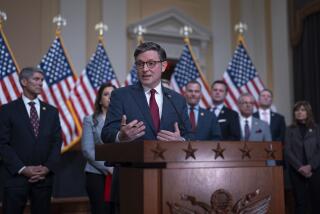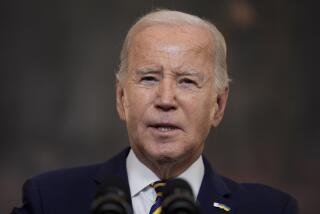Concession Shifts Economic Stimulus Legislation Into Gear
As President Bush stepped up pressure on Congress to produce an economic stimulus bill, a top Democrat made a concession Wednesday that increased the likelihood lawmakers will enact tax cuts and unemployment aid before the end of the year.
After a morning meeting with Bush and other congressional leaders, Senate Majority Leader Tom Daschle (D-S.D.) dropped his insistence that the stimulus bill include $15 billion in funding for homeland security measures. That cleared the way for senior congressional and administration officials to meet late Wednesday and begin negotiating a compromise on other elements of the stimulus bill, including a new proposal to suspend payroll taxes for one month.
The stakes for the economy were underscored Wednesday when Bush’s budget director, Mitchell E. Daniels Jr., announced that the federal budget would probably not come back into balance until 2005 at the earliest.
However, many thorny differences remained to be ironed out between the Republican-controlled House and the Democratic-controlled Senate. As a result, lawmakers say it is still uncertain whether a stimulus bill can be enacted before the end of the year.
“We’re going to go forward . . . but it’s not going to be easy,” said House Ways and Means Committee Chairman William M. Thomas (R-Bakersfield).
Bush Pushes Stepping Up Income Tax Rate Cuts
Indeed, the first meeting of congressional and administration negotiators Wednesday night made clear how hard it will be. The session was short, never got beyond squabbling over procedures, and broke up with an agreement only to meet again. But Senate Finance Committee Chairman Max Baucus (D-Mont.) said no one questioned the need to produce a bill this year.
“There was a strong feeling in the room that we must, we should and we will produce economic stimulus legislation this session,” Baucus said.
Bush, in a speech Wednesday to an agricultural group, leaned on congressional leaders to break the impasse and drop the Senate Democrats’ proposals to boost security spending.
“It is important for the Senate not to look for new ways to spend money, but for new ways to create new jobs,” Bush said. “Let’s get the job done.”
One of the biggest remaining disputes centers on Bush’s proposal to speed up cuts in the income tax rate, which were supposed to take effect gradually under the tax cut approved earlier this year. Most Democrats voted against that bill and now even more adamantly oppose speeding up the rate cut.
That clash highlights the extent to which the final negotiations will pit Democrats’ priorities against Republicans’ as they calibrate how much of the bill’s benefits will be distributed among business interests, individual taxpayers and unemployed people.
Bush, in his speech, reiterated his priorities for the stimulus bill: accelerate the income tax rate cuts, repeal the alternative minimum tax for corporations, extend unemployment benefits and provide new tax incentives for businesses to invest in equipment and other capital expenses.
“This country is waiting for action,” the president said, noting that during the seven weeks since he proposed his economic stimulus package, more than 415,000 people have lost their jobs. “Further delay could put more Americans and more families at risk.”
The House passed its version of the economic stimulus bill--a $100-billion tax cut for businesses and individuals--last month. Senate Democrats tried to pass a $73-billion bill, weighted more heavily to spending for aid to the jobless, but that bill was blocked by Republicans.
At that point, congressional leaders hoped to begin high-level negotiations to produce a compromise. But the process stalled over Daschle’s insistence that negotiations include the Democrats’ $15-billion homeland security proposal, which provided money for law enforcement, public health and other anti-terrorism programs. Republicans refused to consider that as part of the stimulus bill, saying it had nothing to do with shoring up the economy.
Daschle has been under growing pressure to bend. On Tuesday, Senate GOP leaders tried to goad him into action by offering a compromise that included the payroll tax “holiday,” which is popular with Democrats as well as Republicans. In recent days Bush and his lieutenants have become more engaged in lobbying for an economic stimulus bill--including Wednesday morning’s meeting with the congressional leaders.
After the meeting, Daschle told reporters that Democrats were willing to cut their proposal in half, to $7.5 billion, and remove it from debate on the economic stimulus bill. Instead, Daschle said he would try to put the extra money into the defense appropriation bill.
House Democrats tried the same gambit on Wednesday but failed. An effort to allow their amendment to be offered during the House’s defense debate was blocked, 216 to 211.
Payroll Tax ‘Holiday’ Looks Like a Longshot
Bush has threatened to veto any bill that outspends the budget he has endorsed. White House spokesman Ari Fleischer welcomed Daschle’s decision to cut his spending proposal in half but said that Bush would still veto the measure if it got to his desk.
“It’s movement in the right direction, but there is additional movement to be made in order for the Senate to be able to pass a spending bill that keeps the agreement they promised,” Fleischer said. Asked how much more Daschle should retreat, Fleischer said, “About another $7.5 billion more.”
The White House also sent lukewarm signals about the proposal to suspend payroll taxes for a month. Bush, during a photo session, declined to endorse a payroll tax holiday. Fleischer called it “an interesting idea” and added that Bush would prefer to cut individual income tax rates.
Daschle said he would consider the payroll tax moratorium but said it was a “nonstarter” if linked to Bush’s proposal to speed up income tax cuts.
More to Read
Get the L.A. Times Politics newsletter
Deeply reported insights into legislation, politics and policy from Sacramento, Washington and beyond. In your inbox three times per week.
You may occasionally receive promotional content from the Los Angeles Times.











